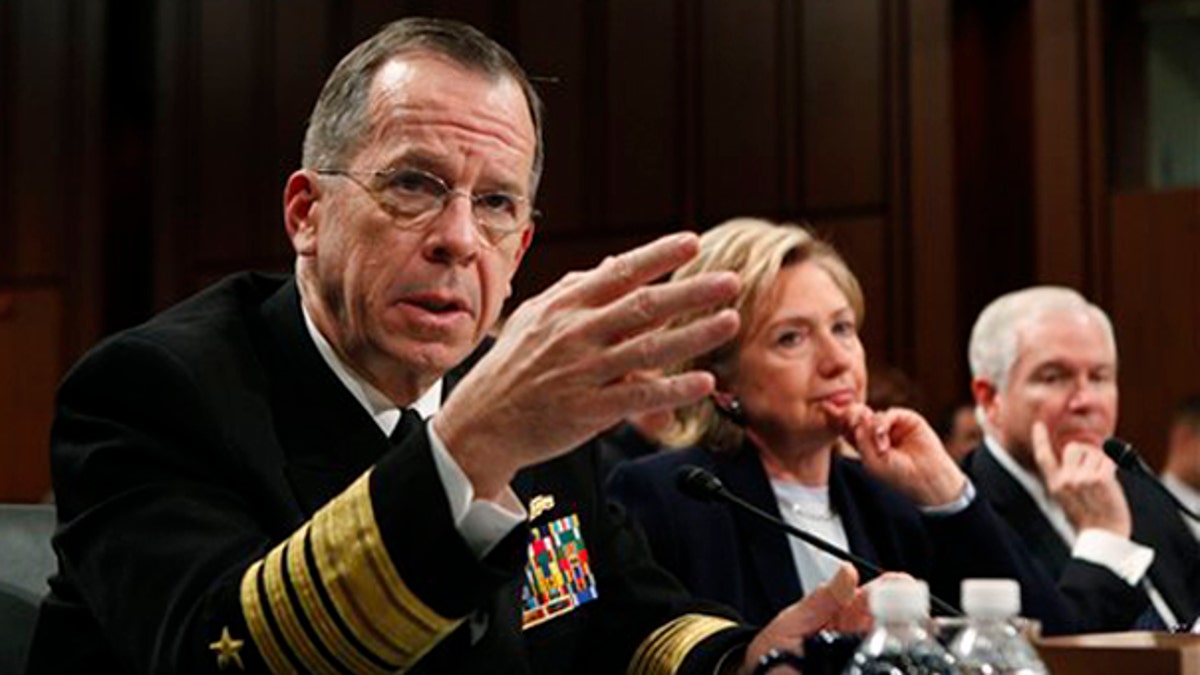
Joint Chiefs Chairman Adm. Michael Mullen, left, testifies on Capitol Hill Dec. 3, as Secretary of State Hillary Clinton and Defense Secretary Robert Gates look on. (AP Photo)
Despite all the talk from top military leaders about how important it is to reverse the Taliban's momentum, Al Qaeda remains the No. 1 target for the U.S. military in Afghanistan and Pakistan and will be the ultimate focus of the upcoming surge of American troops.
Officials say that in the months ahead, the United States will use all military, financial, diplomatic and political tools at its disposal to achieve President Obama's goal of defeating the terrorist group.
Essentially, the administration has defined the Al Qaeda presence along the Afghanistan-Pakistan border as the "epicenter" of Islamic radicalism and suggested that the global threat of terrorism will diminish only if that epicenter can be wiped out.
Al Qaeda's numbers in the region are small. Officials estimate that only 500 operate on both sides of the border, with about 100 in Afghanistan. By contrast, the number of Taliban operatives is pegged at about 50,000 in both countries, with about 20,000 in Afghanistan.
But since Obama outlined his strategy to send 30,000 more U.S. troops to war, officials have described Al Qaeda as the all-controlling and influential head of an extremist network body, whose strongest element is the Taliban.
"Al Qaeda may, in fact, be the architect of (a future terrorist attack), but the Taliban will be the bricklayers," Joint Chiefs of Staff Chairman Adm. Mike Mullen told a Senate committee Thursday.
The strategy? Weaken the body, and ultimately cut off the head.
"Our overarching goal in Afghanistan and Pakistan is to disrupt, dismantle and defeat (Al Qaeda) and prevent its return to both countries," Pentagon spokesman Col. Dave Lapan told Fox News in an e-mail.
Lapan said the administration plans to do that by denying Al Qaeda a safe haven, reversing Taliban gains while denying them the ability to control population centers, and strengthening Afghan security forces and government.
"On the military side, we'll use all means necessary -- ground and air, kinetic and non-kinetic," he said.
The unspoken element of this strategy is to continue aerial, unmanned drone attacks on the Pakistani side of the border even as the United States leans on and funds the Pakistani government so it will take on more of the fight itself.
Secretary of State Hillary Clinton said Wednesday that the Pakistanis' latest military campaigns against Taliban in the Swat Valley and South Waziristan show they've "really stepped up" as a partner in the fight. But hammering away at what officials call the "collusion" between the Taliban and Al Qaeda, she said recent Taliban attacks on Pakistani targets were inspired, funded and planned by Al Qaeda.
Obama and military officials seem more interested in going after Al Qaeda as a whole than Usama bin Laden specifically.
While Lapan said bin Laden's capture remains a priority, International Security Assistance Force spokesman Col. Wayne Shanks said Western forces are by no means crawling through caves to find him.
"(Bin Laden) is a priority as he is a figurehead, but are we running each cave down trying to look for him? Probably not. If we had a hot lead we'd follow it, but as of now we have other priorities," he told Fox News.
Obama's public posture toward bin Laden has softened since last year's election campaign.
"We will kill bin Laden, we will crush Al Qaeda. That has to be our biggest national security priority," he said during an October 2008 debate.
But Obama qualified that statement in an interview with CBS News shortly before he took office.
"I think that we have to so weaken his infrastructure that, whether he is technically alive or not, he is so pinned down that he cannot function. My preference obviously would be to capture or kill him. But if we have so tightened the noose that he's in a cave somewhere and can't even communicate with his operatives, then we will meet our goal of protecting America," he said.
Today, even as Al Qaeda spreads its tentacles to countries like Somalia and Yemen, officials say the Afghanistan-Pakistan border region remains the soul of the movement.
"The Al Qaeda presence and its leadership in the border area of Afghanistan and Pakistan is still the wellspring of inspiration for extremist jihadism everywhere," Defense Secretary Robert Gates said Wednesday. "Whether it's in the United States and the plots that we continue to see or in Somalia or Yemen, the fact is that the inspiration and oftentimes the guidance and strategic leadership comes from the Al Qaeda leadership that is there in that border area.
"If that center were to disappear, if that leadership were to disappear and Al Qaeda were defeated in Afghanistan and Pakistan, I think you would face a very different and very significantly less important threat from these various regional movements," he said.
Fox News' Justin Fishel contributed to this report.












































